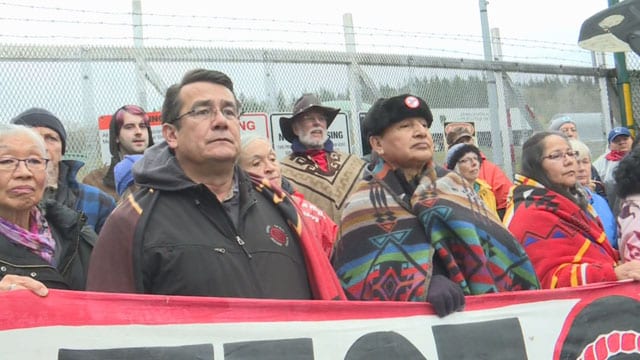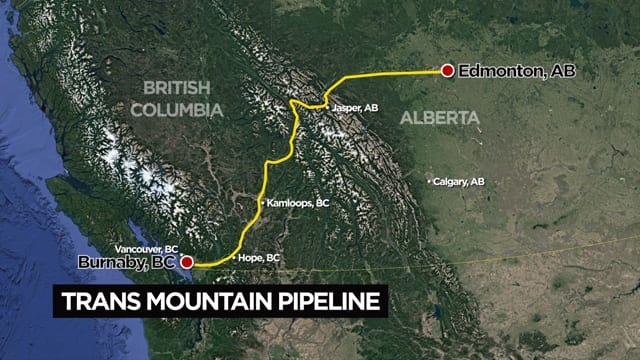As Feds and Alberta talk, Indigenous rights left out of Trans Mountain debate
As Ottawa, Alberta and British Columbia draw battle lines over the Trans Mountain pipeline expansion, First Nations leaders say there’s too much focus on politics – and not enough on the Indigenous rights and people fighting to protect unceded land.
As Ottawa, Alberta and British Columbia draw battle lines over the Trans Mountain pipeline expansion, First Nations leaders say there’s too much focus on politics – and not enough on the Indigenous rights and people fighting to protect unceded land.
“They’re trying to sweep us under the rug wherever they can,” said Serge Simon, Grand Chief of the Mohawk Nation of Kahnesatake, and head of the Treaty Alliance Against the Tar Sands Expansion who has joined the protest movement in Burnaby, B.C.
“They refuse to acknowledge that it’s the First Nations out west that are prepared to be arrested,” he said. “They’re prepared to go all-out to prevent this from being built.
“It’s all a matter of suppressing Indigenous rights.”
On Sunday, Kinder Morgan announced it would halt all “non-essential” spending on the $7.4 billion project until May 31. If there’s no consensus among stakeholders before the deadline, the company said it could back out.
Two days later, Liberal cabinet ministers rushed to Ottawa for an emergency meeting on the pipeline.
Ministers had little to say about any concrete details on next steps, but Natural Resources Minister Jim Carr reiterated that they are “100 per cent” behind the project.

Federal Finance Minister Bill Morneau said Ottawa is looking at several “financial options” to ensure the Alberta-B.C. pipeline expansion gets built, including taking a monetary stake in the project. But any federal investment in the pipeline would first require closed-door talks with Kinder Morgan and the two provinces, he added.
“That will require us to talk with the project proponent,” Morneau told a Toronto news conference. “That will require us to talk with the provinces, and we’re not going to negotiate in public or talk about those options publicly at this stage.
Morneau wouldn’t speculate on whether penalizing B.C. financially – such as by withholding transfer payments – remained an option.
“I’m not going to publicly negotiate with any one of the parties,” he said. “Public threats, in my estimation, aren’t helpful.”
But Morneau, like his cabinet colleagues, has not said anything about the First Nation opposition to the project.
And throughout all this, Indigenous rights have been left out of the debate, said Grand Chief Stewart Phillip, president of the Union of B.C. Indian Chiefs.
“I think the focus on the jurisdictional squabble with British Columbia is not reflective of all of the significant issues involved in this situation and, of course, I’m referring to the issue of the essential consent of the Indigenous people along the proposed pipeline route,” he said.

More than 30 Indigenous communities along the pipeline’s route support the project, but many other communities in B.C. do not.
Opponents of the pipeline fear potential oil spills along the B.C. coast and argue that Indigenous communities have not given their consent to the project, violating their constitutional rights.
B.C. is also part of a lawsuit against Ottawa arguing there was not proper consultation with Indigenous communities or other stakeholders when the pipeline was reviewed.
A decision, in that case, is expected any day.
Regardless of the outcome, Simon said “major reconciliation” will be needed among Indigenous people and different levels of government.
“Eventually, we’re going to have to look at the damages and how are we going to repair those broken relationships.”
– With files from The Canadian Press












Let me get this straight – this is all about suppressing indigenous rights, trying to sweep Indigenous Peoples under the rug, and Indigenous rights have been left out of the debate – BUT more than 30 Indigenous communities along the pipeline’s route support the project (meaning they accepted money). Something doesn’t add up there. And apparently “they refuse to acknowledge that it’s the First Nations out west that are prepared to be arrested” – yet based on the two photos of protestors the majority are non-Indigenous. And to top it off a requirement for consent was claimed twice – the Province has no legal requirement to gain consent from any First Nation, except those with legal rights and title – which eliminates almost all of them. The province only has duty to CONSULT.
you are looking at the wrong photo
Last Saturday the entire executive of UBCIC went up to the gates to be arrested
Let me get this straight – this is all about suppressing indigenous rights, trying to sweep Indigenous Peoples under the rug, and Indigenous rights have been left out of the debate – BUT more than 30 Indigenous communities along the pipeline’s route support the project (meaning they accepted money). Something doesn’t add up there. And apparently “they refuse to acknowledge that it’s the First Nations out west that are prepared to be arrested” – yet based on the two photos of protestors the majority are non-Indigenous. And to top it off a requirement for consent was claimed twice – the Province has no legal requirement to gain consent from any First Nation, except those with legal rights and title – which eliminates almost all of them. The province only has duty to CONSULT.
you are looking at the wrong photo
Last Saturday the entire executive of UBCIC went up to the gates to be arrested